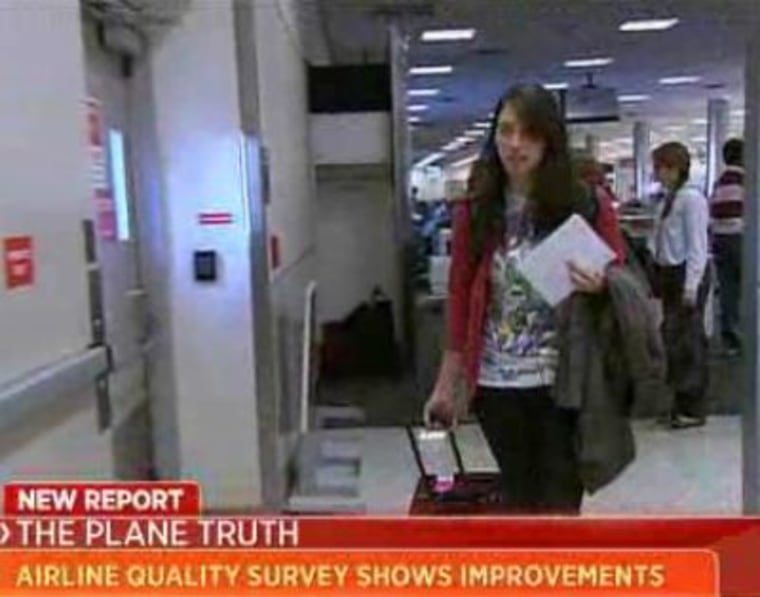U.S. airlines are operating more flights on time and losing fewer bags but still failing to impress passengers, according to a new report.
Released on Monday, the latest Airline Quality Rating (AQR) report shows a significant disconnect between operational success and customer satisfaction.
“Performance is 'did the airline do what it promised to do',” said Dean Headley, a marketing professor at Wichita State University and coauthor of the annual report. “Perception is about what passengers think happened.”
And when it comes to performance, the industry is clearly on an upswing, having improved for at least four of the last five years. For 2012, the industry maintained pace with 2011's results, which were the best in the project's 23-year history.
Virgin America topped the overall airline quality rankings, followed by Jet Blue, Air Tran, Delta and Hawaiian airlines. United Airlines came in last.
To compile the annual report, Headley and coauthor Brent Bowen of Purdue University take the year-end data that 14 airlines provide to the Department of Transportation (DOT) and assign weighted values to four parameters: on-time performance, (involuntary) denied boardings, mishandled bags and customer complaints.
Among the specific findings:
On-time performance: Overall, the industry operated 81.8 percent of its flights on time last year, up from 80 percent in 2011. Hawaiian Airlines had the best record (93.4 percent); American Airlines and ExpressJet (76.9 percent) had the worst.
Denied boardings: U.S. airlines bumped more passengers last year — 0.97 per 10,000 passengers vs. 0.78 per 10,000 passengers in 2011 — with JetBlue posting the lowest rate (0.01) and SkyWest the highest (2.32)
Mishandled bags: The mishandled baggage rate for the industry decreased from 3.35 per 1,000 passengers in 2011 to 3.07 in 2012. Virgin America had the best record (0.87 bags per 1,000 passengers); American Eagle had the worst (5.80 bags per 1,000 passengers).
And yet, despite the improvement in two of the three categories above, customer complaints, as reported to DOT, jumped 20 percent last year: In 2011, 9,414 passengers filed complaints against U.S. carriers (1.19 complaints per 100,000 passengers); in 2012, 11,445 did so, generating a rate of 1.43 complaints per 100,000 passengers.
One reason for the jump, says Headley, is the continuing consolidation in the industry, which inevitably leads to hiccups in flight operations, customer service and procedures for reservations, ticketing and boarding.
“Why is it that Southwest has just 0.2 complaints per 100,000 passengers and United has 4.2 complaints?” said Headley. “The only thing I can think of is that United is going through a consolidation. That Continental passenger is saying, ‘I don’t like these now-United rules so I’m going to tell somebody.’”
Other industry observers, however, suggest that rising customer dissatisfaction with the airlines goes beyond the basics of operational performance. While the AQR analyzes quantitative measures, there are obviously qualitative difference between the various carriers. After all, an airline can be on time, lose few bags and not bump a soul — and still provide a miserable flying experience thanks to cramped seats, lousy food and fees for everything beyond a seat belt and oxygen mask.
“The air transportation experience is suffering from issues that are not measured in the DOT or AQR,” said Charlie Leocha, director of the Consumer Travel Alliance. For Leocha, other issues, such as proliferating fees, confusing code-share rules and policies that make it difficult for families to sit together without paying extra, add fuel to the flames of passenger frustration.
“One of the unintended consequences of unbundling airfares has been more confusion and the impression that airlines have their hands out around every corner,” he told NBC News.
Put it all together and it seems likely that the airlines will continue to improve their performance although with some turbulence ahead as the mergers of both Southwest and AirTran and American and US Airways progress.
“When airlines combine, more chains get yanked for reasons that passengers find reasonable to complain about,” said Headley. “The sad part is that when I get back from a trip and people ask me how my flight was, the best I can say is it was uneventful.”
Rob Lovitt is a longtime travel writer who still believes the journey is as important as the destination. Follow him on Twitter.
